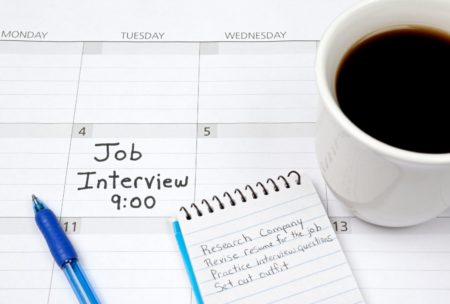2705 students have accelerated their skills with this course
Limited Time Offer: Get All Access Pass For Only $9/Month
CLICK HERE TO START
Career Development Courses
Interviewing Courses

Filters
Courses to get you started
Discover More In Interviewing Courses
Filters
Interviewing Courses

Around 118 people apply for a single job post, and only 20% (approximately 23 or 24) of them make it to the interview phase. So if you received a notification for an interview, consider yourself lucky. All the time and effort you spent creating a killer resume and cover letter paid off.
On average, applicants apply to 27 companies before receiving a callback for a job interview. Are you not receiving responses from the companies you applied for? You probably sent applications to only a few of them. If you do not see enough job posts, try checking job hosting sites like LinkedIn.
Job interviews are necessary for you to move on to the next stage of your career development. Since you cannot skip it, the best way to deal with it is to evolve according to existing standards and demands. It is not enough that you have a stellar background and reference list; you should also possess high-level soft skills, especially communication skills, to progress.
Keep up with the competition by improving your interview skills and other related competencies. E-learning websites like Skill Success will grant you access to accessible and easy-to-follow skill development tutorials. Click on a video or two to prepare for your upcoming interview.
On average, applicants apply to 27 companies before receiving a callback for a job interview. Are you not receiving responses from the companies you applied for? You probably sent applications to only a few of them. If you do not see enough job posts, try checking job hosting sites like LinkedIn.
Job interviews are necessary for you to move on to the next stage of your career development. Since you cannot skip it, the best way to deal with it is to evolve according to existing standards and demands. It is not enough that you have a stellar background and reference list; you should also possess high-level soft skills, especially communication skills, to progress.
Keep up with the competition by improving your interview skills and other related competencies. E-learning websites like Skill Success will grant you access to accessible and easy-to-follow skill development tutorials. Click on a video or two to prepare for your upcoming interview.
Most commonly asked questions about Interviewing Courses
Unless you sharpen your interview skills, it will be challenging to land a competitive job. Having the best resume in the bunch is not enough because it is still critical for you to elaborate on your background and make a good impression.
Here are helpful tips to improve your interview skills:
1. Observe the interviewer closely. Before you talk, listen intently. The key to a successful interview is saying the right words at the right time. Study the interviewer to know how to respond and find the right timing.
2. Master your resume. No other person in the world should know your resume more than you do. There is no need to memorize every line but always know the story for every detail.
3. Find timing for small talk. The interview process does not have to be rigid and strictly about work. Lighten the conversation by bringing up small talk with the interviewer. The real challenge is finding the right timing.
4. Prepare questions for the interviewer. It is helpful to ask relevant questions because it keeps the interview going. In addition, asking the right questions can help the interviewer realize how you want the job.
5. Practice, practice, practice. Practice until you feel confident. You may not get rid of your nervousness, but regular practice will give you the confidence needed to look fearless.
Here are helpful tips to improve your interview skills:
1. Observe the interviewer closely. Before you talk, listen intently. The key to a successful interview is saying the right words at the right time. Study the interviewer to know how to respond and find the right timing.
2. Master your resume. No other person in the world should know your resume more than you do. There is no need to memorize every line but always know the story for every detail.
3. Find timing for small talk. The interview process does not have to be rigid and strictly about work. Lighten the conversation by bringing up small talk with the interviewer. The real challenge is finding the right timing.
4. Prepare questions for the interviewer. It is helpful to ask relevant questions because it keeps the interview going. In addition, asking the right questions can help the interviewer realize how you want the job.
5. Practice, practice, practice. Practice until you feel confident. You may not get rid of your nervousness, but regular practice will give you the confidence needed to look fearless.
Although the world stopped during the earlier stages of the COVID-19 pandemic, it did not stop interview processes from continuing. However, most companies opted to move the selection process online instead of face-to-face interviews to protect hiring managers and applicants from catching the virus. This change became a revolutionary development for employers and employees.
Since most interviews now happen in Zoom calls and other video streaming platforms, applicants had to adapt new interviewing techniques to make better impressions on hiring managers. As a result, many took advantage of digital tools to express themselves better and ensure they were the best applicants for the open position.
As the interview processes moved online, it was also logical for learning institutions to create online courses for job interviews. Of course, online interview courses existed way before the pandemic, but there was a tidal wave of uploads for online interview courses during and after the first wave of COVID-19.
The transition of interview courses to digital platforms is beneficial for everyone. For example, e-learning courses from Skill Success only take a few minutes to hours to complete compared to the ones offered in physical classrooms. Besides, students can adjust their learning pace by fully controlling when to watch the classes.
Since most interviews now happen in Zoom calls and other video streaming platforms, applicants had to adapt new interviewing techniques to make better impressions on hiring managers. As a result, many took advantage of digital tools to express themselves better and ensure they were the best applicants for the open position.
As the interview processes moved online, it was also logical for learning institutions to create online courses for job interviews. Of course, online interview courses existed way before the pandemic, but there was a tidal wave of uploads for online interview courses during and after the first wave of COVID-19.
The transition of interview courses to digital platforms is beneficial for everyone. For example, e-learning courses from Skill Success only take a few minutes to hours to complete compared to the ones offered in physical classrooms. Besides, students can adjust their learning pace by fully controlling when to watch the classes.
Learn from online courses if you are looking for a quick and convenient way to improve your interview skills. If you study with Skill Success, you will find easy-to-follow tutorials to get you into shape for your future employment.
Here are some topics you should focus on when picking interview prep courses:
1. Communications master class. Communication skills are indispensable parts of interviews, and not being good enough could increase the chances of failure. Choose courses that help you refine your speaking abilities, especially during a formal event. Find classes containing proven tips and tricks on what to say and not to say to hiring managers.
2. Guide on dressing smart. What you wear during a job interview can be the fine line that separates your chances of landing a dream job. Look for courses that give pointers on how to utilize the power of dressing up to your advantage. Colors, silhouettes, and combinations have specific effects, so know which ones bring out the best in you.
3. Walkthrough of the interview process. The interview process is not only limited to the one-on-one talk with hiring managers. It has several layers that start with sending an eye-catching resume until the final interview. Applicants should perform marvelously in every stage to be one of the top picks for the position and eventually get hired.
Here are some topics you should focus on when picking interview prep courses:
1. Communications master class. Communication skills are indispensable parts of interviews, and not being good enough could increase the chances of failure. Choose courses that help you refine your speaking abilities, especially during a formal event. Find classes containing proven tips and tricks on what to say and not to say to hiring managers.
2. Guide on dressing smart. What you wear during a job interview can be the fine line that separates your chances of landing a dream job. Look for courses that give pointers on how to utilize the power of dressing up to your advantage. Colors, silhouettes, and combinations have specific effects, so know which ones bring out the best in you.
3. Walkthrough of the interview process. The interview process is not only limited to the one-on-one talk with hiring managers. It has several layers that start with sending an eye-catching resume until the final interview. Applicants should perform marvelously in every stage to be one of the top picks for the position and eventually get hired.
Interview preparation courses are an added step for job interviews. While these courses are unnecessary to land your dream job, they are valuable investments with fruits you can carry throughout your career. Following the core lessons of these courses can help expand your options and lead you to a more successful career.
Besides, job interviews are becoming more challenging to secure, forcing candidates to do more to land a job position. As job applications move online, it is easier to send applications, but it means that more people could become your competitors. Standing out from a crowd is a tall order, especially when human resources departments sift through hundreds of e-mails daily.
Job interview preparation courses will guide you on what you should and should not do during the interview process. They include tips to help you navigate conversations with hiring managers and achieve desirable results. Even if you do not have the best work background and skill sets, these courses can help make you more attractive in employees' eyes.
Going through a few preparation courses will make notable changes in your job interview game but do not be stagnant. Your learning process should continue because job interview trends and demands fluctuate unpredictably. If you are looking for reliable job interview preparation courses, Skill Success has an extensive library you can check.
Besides, job interviews are becoming more challenging to secure, forcing candidates to do more to land a job position. As job applications move online, it is easier to send applications, but it means that more people could become your competitors. Standing out from a crowd is a tall order, especially when human resources departments sift through hundreds of e-mails daily.
Job interview preparation courses will guide you on what you should and should not do during the interview process. They include tips to help you navigate conversations with hiring managers and achieve desirable results. Even if you do not have the best work background and skill sets, these courses can help make you more attractive in employees' eyes.
Going through a few preparation courses will make notable changes in your job interview game but do not be stagnant. Your learning process should continue because job interview trends and demands fluctuate unpredictably. If you are looking for reliable job interview preparation courses, Skill Success has an extensive library you can check.
Average job interviews last 45 minutes to one hour, but it does not mean you should come unprepared. The time you spend in the interview room is short, but a lot can happen before and after the interview. For your part, you should invest some time preparing.
Here are steps you can take to prepare for a job interview:
1. Research about the employer or company. Get all the relevant information about the company you are applying for. Interviewers often ask applicants what they know about their company, and giving an impressive answer to this question can earn you major brownie points.
2. Study the job description. Know what the job description entails before even sending a resume. Ensure that your skills and experiences align with what the company is looking for so that you will have a dynamic interview.
3. Dress appropriately. Dress codes matter and you should not take them for granted. Dressing the part means that you prepared for the interview and spent some effort to look presentable.
4. Prepare work portfolios in advance. Some interviews will require you to present portfolios. For example, it would benefit you to compile previous work accomplishments for technical interviews. Preparing in advance will help you curate a more organized portfolio, compared to a last-minute one.
5. Polish your interviewing skills. The success of your interview relies primarily on your interview skills. You should prioritize three things: talking, dressing up, and acting formally. If you master these three, you will feel more confident interacting with the hiring managers.
Here are steps you can take to prepare for a job interview:
1. Research about the employer or company. Get all the relevant information about the company you are applying for. Interviewers often ask applicants what they know about their company, and giving an impressive answer to this question can earn you major brownie points.
2. Study the job description. Know what the job description entails before even sending a resume. Ensure that your skills and experiences align with what the company is looking for so that you will have a dynamic interview.
3. Dress appropriately. Dress codes matter and you should not take them for granted. Dressing the part means that you prepared for the interview and spent some effort to look presentable.
4. Prepare work portfolios in advance. Some interviews will require you to present portfolios. For example, it would benefit you to compile previous work accomplishments for technical interviews. Preparing in advance will help you curate a more organized portfolio, compared to a last-minute one.
5. Polish your interviewing skills. The success of your interview relies primarily on your interview skills. You should prioritize three things: talking, dressing up, and acting formally. If you master these three, you will feel more confident interacting with the hiring managers.
A job interview is a crucial and often indispensable step toward employment. It is a serious matter that requires your 100%; otherwise, the interviewers could easily remove you from the shortlist.
If you are attending a job interview for the first time or have been in the game for a while and want to improve your interview experience, try these practices:
1. Calm your senses. It can be challenging to remain calm because the interview process is always a nerve-wracking experience. However, it would be best if you keep your nerves in control because the excessive portrayal of nervousness can create negative impressions. Lacking composure may mean you are unreliable, emotionally unstable, and unable to work under pressure.
2. Join mock interviews. A mock interview emulates an actual job interview where applicants can receive feedback based on their performance. Mock interviews try to simulate a realistic job interview to put pressure on applicants so that they will give a good performance. Do not feel too bad if you make mistakes because this experience will help you grow.
3. Watch yourself in the mirror. If you cannot find time to attend mock interviews, then practice at home. Find a big mirror where you can see your reflection clearly and simulate an interview. Watching yourself while answering questions allows you to assess yourself and correct unusual habits. Be your first critique before anybody points out your mistakes.
4. Know what hiring managers are looking for. The job description lists the attributes of what the company is looking for in a candidate. Sometimes, they add extra details like the disposition and attitude potential employees should have to blend seamlessly with the company culture. Look out for these minute details and highlight them during the interview to pique the hiring managers' interests.
5. Determine if you are undergoing a technical interview or not. Technical interviews differ from typical job interviews because companies might require practical demonstrations and other activities. Knowing the type of interview can give you an upper hand because you could set time for preparation. Showing you that you have prepared for the interview can impress the hiring managers.
6. Expand your vocabulary. The words you say during the interview could make or break your chances of landing the job. You do not have to be a linguist to sound smart, but you could sound more professional if you use several alternative words instead of repeatedly using the same term in every sentence.
7. Draft an elevator pitch. An elevator pitch is a quick and convincing discussion of something you want to present to another party. Interviewees use this tool to create an impactful mark on hiring managers. Prepare an elevator pitch that summarizes your top skills and experiences and wrap it up by explaining why you are the best candidate for the role.
If you are attending a job interview for the first time or have been in the game for a while and want to improve your interview experience, try these practices:
1. Calm your senses. It can be challenging to remain calm because the interview process is always a nerve-wracking experience. However, it would be best if you keep your nerves in control because the excessive portrayal of nervousness can create negative impressions. Lacking composure may mean you are unreliable, emotionally unstable, and unable to work under pressure.
2. Join mock interviews. A mock interview emulates an actual job interview where applicants can receive feedback based on their performance. Mock interviews try to simulate a realistic job interview to put pressure on applicants so that they will give a good performance. Do not feel too bad if you make mistakes because this experience will help you grow.
3. Watch yourself in the mirror. If you cannot find time to attend mock interviews, then practice at home. Find a big mirror where you can see your reflection clearly and simulate an interview. Watching yourself while answering questions allows you to assess yourself and correct unusual habits. Be your first critique before anybody points out your mistakes.
4. Know what hiring managers are looking for. The job description lists the attributes of what the company is looking for in a candidate. Sometimes, they add extra details like the disposition and attitude potential employees should have to blend seamlessly with the company culture. Look out for these minute details and highlight them during the interview to pique the hiring managers' interests.
5. Determine if you are undergoing a technical interview or not. Technical interviews differ from typical job interviews because companies might require practical demonstrations and other activities. Knowing the type of interview can give you an upper hand because you could set time for preparation. Showing you that you have prepared for the interview can impress the hiring managers.
6. Expand your vocabulary. The words you say during the interview could make or break your chances of landing the job. You do not have to be a linguist to sound smart, but you could sound more professional if you use several alternative words instead of repeatedly using the same term in every sentence.
7. Draft an elevator pitch. An elevator pitch is a quick and convincing discussion of something you want to present to another party. Interviewees use this tool to create an impactful mark on hiring managers. Prepare an elevator pitch that summarizes your top skills and experiences and wrap it up by explaining why you are the best candidate for the role.
Besides knowing what you should bring for your interview, you should also be aware of the things that you should not. It is a rookie mistake to carry something that disappoints or shocks an interviewer. Do not bring more than what is necessary.
Unless asked, do not bring the following to the interview room:
1. Food. Eating during an interview process can be considered rude by many interviewers. Even if the interviewer allows you to have a nibble while talking, try to keep it to a minimum. Munching on something while talking can obstruct your communication with the hiring managers. If you need to eat, do it before the interview.
2. Hats. It is an old etiquette rule to take off your hat indoors, especially conversing with someone. Keeping your hat on can translate as being disrespectful to the other party. It does not matter what kind of hat you wear but always take it off when you are in the interview room.
3. Phones and gadgets. Before the interview, turn off your phones or put them in silent mode. You must give your undivided attention to the interviewer and establish a good rapport with them. Do not even think about glancing at your phone for a second. It can give the impression that you are disinterested in the interview.
4. Distressed or dirty clothes. Not all job interviews require applicants to wear formal clothes but never come looking unruly. How you look says a lot about your character. To be safe, pick appropriate attire for the company you are applying to. Also, ensure that your clothes are well-kept and devoid of noticeable stains and wrinkles.
5. Companions. It is rare for job interviews to allow applicants to bring someone else with them during the process. It is because having someone with you during the interview can be distracting. Besides, you need to answer the questions yourself and show the interviewer your independence as a working professional.
6. Tardiness. It is never okay to be late at any stage of the interview process. Applicants should remember that the interview process is a fragile stage because any impression they leave on interviewers may leave a permanent mark. Tardiness is a strong sign of irresponsibility, and this trait can hurt your chances of moving on to the next phase.
7. Bad attitude. It is good to bring your personality during the interview, but no one wants a rude and dishonest candidate. An interview is a formal process; you must always be on your best behavior. Behave appropriately and refrain from being overly familiar because the interviewer can interpret said actions negatively.
Unless asked, do not bring the following to the interview room:
1. Food. Eating during an interview process can be considered rude by many interviewers. Even if the interviewer allows you to have a nibble while talking, try to keep it to a minimum. Munching on something while talking can obstruct your communication with the hiring managers. If you need to eat, do it before the interview.
2. Hats. It is an old etiquette rule to take off your hat indoors, especially conversing with someone. Keeping your hat on can translate as being disrespectful to the other party. It does not matter what kind of hat you wear but always take it off when you are in the interview room.
3. Phones and gadgets. Before the interview, turn off your phones or put them in silent mode. You must give your undivided attention to the interviewer and establish a good rapport with them. Do not even think about glancing at your phone for a second. It can give the impression that you are disinterested in the interview.
4. Distressed or dirty clothes. Not all job interviews require applicants to wear formal clothes but never come looking unruly. How you look says a lot about your character. To be safe, pick appropriate attire for the company you are applying to. Also, ensure that your clothes are well-kept and devoid of noticeable stains and wrinkles.
5. Companions. It is rare for job interviews to allow applicants to bring someone else with them during the process. It is because having someone with you during the interview can be distracting. Besides, you need to answer the questions yourself and show the interviewer your independence as a working professional.
6. Tardiness. It is never okay to be late at any stage of the interview process. Applicants should remember that the interview process is a fragile stage because any impression they leave on interviewers may leave a permanent mark. Tardiness is a strong sign of irresponsibility, and this trait can hurt your chances of moving on to the next phase.
7. Bad attitude. It is good to bring your personality during the interview, but no one wants a rude and dishonest candidate. An interview is a formal process; you must always be on your best behavior. Behave appropriately and refrain from being overly familiar because the interviewer can interpret said actions negatively.





































